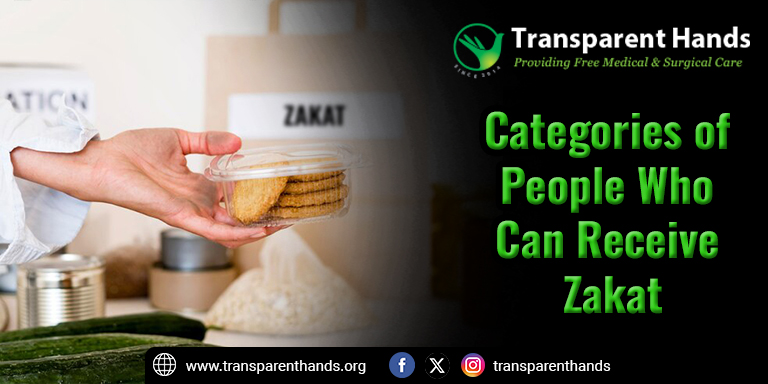Categories of People Who Can Receive Zakat

Islam has placed great significance on Zakat. This is the third pillar of Islam that Muslims must abide by, preceded by Shahada and Salat.
Zakat is mandatory, which is what essentially differentiates it from Sadaqah. Additionally, Sadaqah also does not have any rules for eligibility, and whosoever wishes can give it. Zakat, however, is an obligation and is “fard” on every believer who qualifies for it.
As mentioned in Surat Al-Baqarah in the Holy Quran, “Righteousness is not that you turn your faces toward the east or the west, but [true] righteousness is [in] one who believes in Allah, the Last Day, the angels, the Book, and the prophets and gives wealth, in spite of love for it, to relatives, orphans, the needy, the traveler, those who ask [for help], and for freeing slaves; [and who] establishes prayer and gives zakah; [those who] fulfill their promise when they promise; and [those who] are patient in poverty and hardship and during battle. Those are the ones who have been true, and it is those who are the righteous.” (Quran 2:177).
When you spend your wealth for the sake of Allah (SWT), it purifies your heart and removes the love of material wealth. The one giving Zakat offers it as a humble gift, confirming that they hold nothing more valuable in this life than the love of Allah. In Surah At-Tawbah in the Quran, Allah (SWT) says: “Take, [O, Muhammad], from their wealth a charity by which you purify them and cause them increase, and invoke [ Allah’s blessings] upon them. Indeed, your invocations are reassurance for them. And Allah is Hearing and Knowing.” (Quran 9:103). This shows how giving Zakat purifies both your wealth and soul, bringing Allah’s (SWT) blessings to you.
This article covers some of the rules of giving Zakat and also mentions the categories of people who are entitled to receive zakat.
Who is Zakat Obligatory on
Allah (SWT) has made Zakat as an obligatory act of worship for sane and adult Muslims who possess a certain amount of wealth, which is called “Nisab”. This minimum quantity equates to the value of 612.36 grams of silver. If your total wealth, including savings, investments, and any other assets you might have, meets or exceeds this value, you’ll be eligible to give Zakat.
The amount of Zakat you’ll give is 2.5% of the total wealth you have which is equal to or surpasses the nisab threshold. This is calculated over the course of one lunar year and so believers have to give once a year if they qualify. You can use Transparent Hands’ online Zakat calculator to find the exact amount you need to pay.
In a Hadith, the Holy Prophet (SAW) mentions, “Islam has been built on five [pillars]: testifying that there is no deity worthy of worship except Allah and that Muhammad is the Messenger of Allah, establishing the salah (prayer), paying the zakat (obligatory charity), making the hajj (pilgrimage) to the House, and fasting in Ramadhan.” [Bukhari & Muslim].
Types of Wealth on Which Zakat is Obligatory
- Any form of gold like jewelry or solid gold, whether you’re using it or not
- Silver in any form and for any use or purpose
- Your cash in:
- Bank accounts
- EasyPaisa
- Other digital/online payment platforms
- Loans handed out to other people
- Business investments
- Trade goods you have purchased for the purpose of selling
How to Give Zakat
When you donate a portion of your wealth as Zakat, there are some rules and guidelines that need to be followed. First comes the intention (niyah) for this act of worship. The Prophet Muhammad (SAW) said, “The (reward of) deeds, depend upon the intentions and every person will get the reward according to what he has intended.” [Sahih al-Bukhari 6689].
Then comes the timing and calculation of the amount. It’s stressed that this act of worship must be carried out in a timely manner. The Quran states, “And establish prayer and give zakah, and whatever good you put forward for yourselves – you will find it with Allah. Indeed, Allah of what you do, is Seeing.” (Quran 2:110). At the time of distribution, find eligible recipients of Zakat and it’s best that you maintain secrecy while giving. As Allah says, “If you disclose your charitable expenditures, they are good; but if you conceal them and give them to the poor, it is better for you, and He will remove from you some of your misdeeds [thereby]. And Allah , with what you do, is [fully] Acquainted.” (Quran 2:271).
Eligible Receivers of Zakat
The Quran has stated that there are 8 Masarif e Zakat. These are people who you can give your Zakat to. Allah mentions them in Surah At-Tawbah: “Zakah expenditures are only for the poor and for the needy and for those employed to collect [zakah] and for bringing hearts together [for Islam] and for freeing captives [or slaves] and for those in debt and for the cause of Allah and for the [stranded] traveler – an obligation [imposed] by Allah . And Allah is Knowing and Wise.” (Quran 9:60).
The Poor (Fakir)
The first are people who lack wealth and suffer from extreme poverty, lacking even the most basic necessities needed for survival.
The Needy (Miskin)
Islam classifies the needy as those who own some wealth, but it’s not enough for them to carry out their basic needs. They struggle to make ends meet.
Zakat Collectors (Amin)
Those Muslims who have been tasked by local governments or authorities to collect and distribute this charity are also Masarif e Zakat. They can also receive a portion as a salary for their job.
New Converts (Muallaf)
Muslims who have accepted Islam and taken their Shahada recently are also eligible. Some of these may be leaving their old lives behind as well as may struggle as a convert.
Slaves/Captives (Riqab)
You can also use your Zakat to pay for the release of slaves and captives. This category includes those Muslims who have been captured by Non-Muslims as well.
Those in Debt (Gharmin)
Individuals who have taken a debt to pay for the necessities of life and are now faced with issues in returning it can receive Zakat funds.
In Allah’s Cause (Fisabillillah)
Zakat can also be used to support Muslims who are fighting for the cause of Allah (SWT) and Islam. Those in Jihad are included here whether it be physical warfare or spreading the word of God.
Travelers (Ibnus Sabil)
Those travelers who are stranded and in need of financial aid can be given charity. For example, if someone on a journey has run out of money to reach home, they will be eligible.
To make it valid, it’s important not only to spend Zakat on eligible recipients but also to transfer ownership of your Zakat.
Pay Zakat With Ease Through Transparent Hands
Here’s how we’ve made easier for you to give Zakat:
- You can calculate your Zakat with ease with our online calculator.
- Transparent Hands’ has a long list of Zakat-eligible patients who need your support.
- Muslims from around the globe can pay Zakat online using secure payment methods.
Conclusion
The beneficiaries of Zakat in Islam consist of people who fall under the above eight categories. Furthermore, Care must be taken while donating as this is a major component of our faith.
The Prophet Muhammad (SAW) stated, “Charity does not decrease wealth, no one forgives another except that Allah increases his honor, and no one humbles himself for the sake of Allah except that Allah raises his status.” [Sahih Muslim 2588].
Remember that you’re giving for the sake of Allah, so give when it’s due and hope to get the reward from Allah (SWT) in this world and the hereafter. Give your Zakat to support needy patients across Pakistan.











Jazaak Allah Khair for the perfectly compiled information
Is it possible to elaborate the 7th point, “in the cause of Allah (SWT)”?